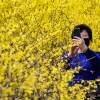Meteorologist Dave Epstein is our go-to person for pressing weather questions on everything from winter blizzards to summer droughts. He’s also a horticulturist, meaning he’s an expert in anything that grows leaves and flowers. GBH's Morning Edition asked our audience for weather and gardening questions, and Epstein graciously answered them on the air. This transcript has been edited for clarity.
Have a gardening or weather question for meteorologist Dave Epstein? Tweet him @GrowingWisdom, email us at thewakeup@wgbh.org, or text 617-300-2008.
I've noticed that my black bamboo is completely brown after last year's dry-then-frigid weather. Is it toast, or should I hope for a rebound? — Betsy in Dorchester
Bamboo plants across the area have been looking a bit shabby, Epstein said, likely because of dry conditions.
“Mine look terrible,” Epstein said. “But if you look closely at the canes, I'm starting to see some new shoots come up.”
It comes down to one thing gardeners can control and one thing they can’t: How often is the plant watered? And what variety of bamboo was planted?
“Bamboos tend to like it pretty moist. So you definitely want to make sure that has adequate water,” Epstein said. “It should leaf out again depending on what variety it is. If it's a variety that's just marginally hardy, it may not, but the odds are it will if it's been in the ground for a long time.”
I have a wisteria that was just gorgeous each year. This year it not only has no blooms, but no leaves as well. I think it’s dead, but plan to leave it for a year in hopes of it coming back. It’s located in a windy area (southern wind). Any advice? — Donna in Warwick
Epstein recommended checking the base of the plant, where it meets the ground, and scratching it with a fingernail to see if there’s any green bark visible. If there is, the plant may still come back. If not, it may be time to say goodbye.
“She's doing the right thing by sort of waiting a little bit,” Epstein said. “I think at this point, if you don't see any growth on it at all, it's probably toast. And you don't want to necessarily leave it for a year. It's not going to come back.”
Use this as a chance to replace it with something new, he said.
“It’s an opportunity for new life in a new spot,” he said.
When Epstein has to say goodbye to a tree or shrub in his yard, he typically choses a different kind of plant to put in its place.
“I have Japanese maples that have died. I didn’t replace it with a Japanese maple because there's a fungus in the soil that's killing the maples,” he said. “It depends on why what happened happened. Is it localized because of some disease that's there? Then you do not want to plant the same thing."









